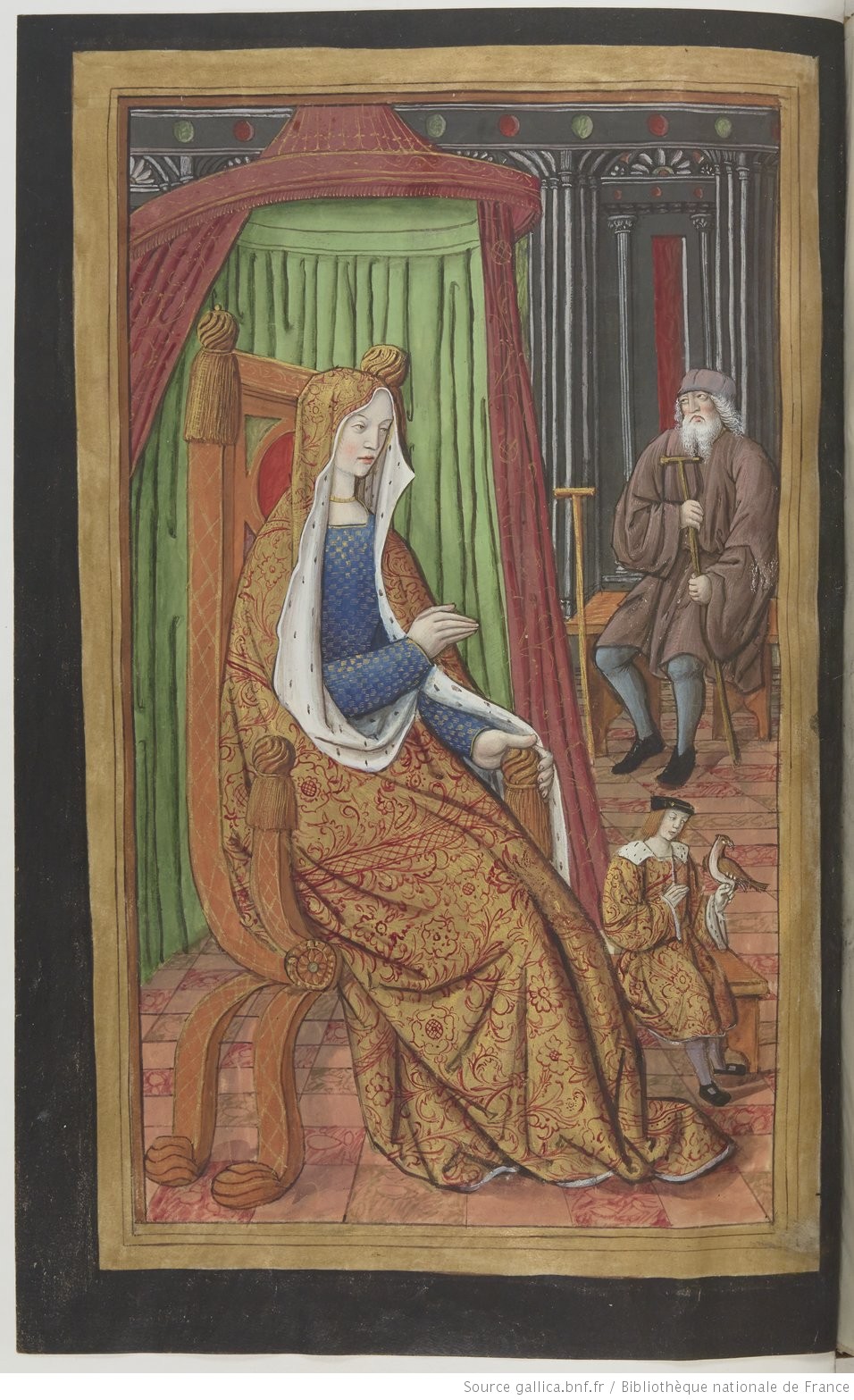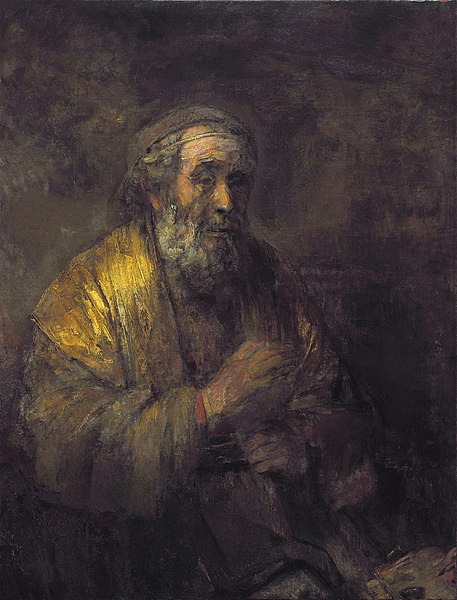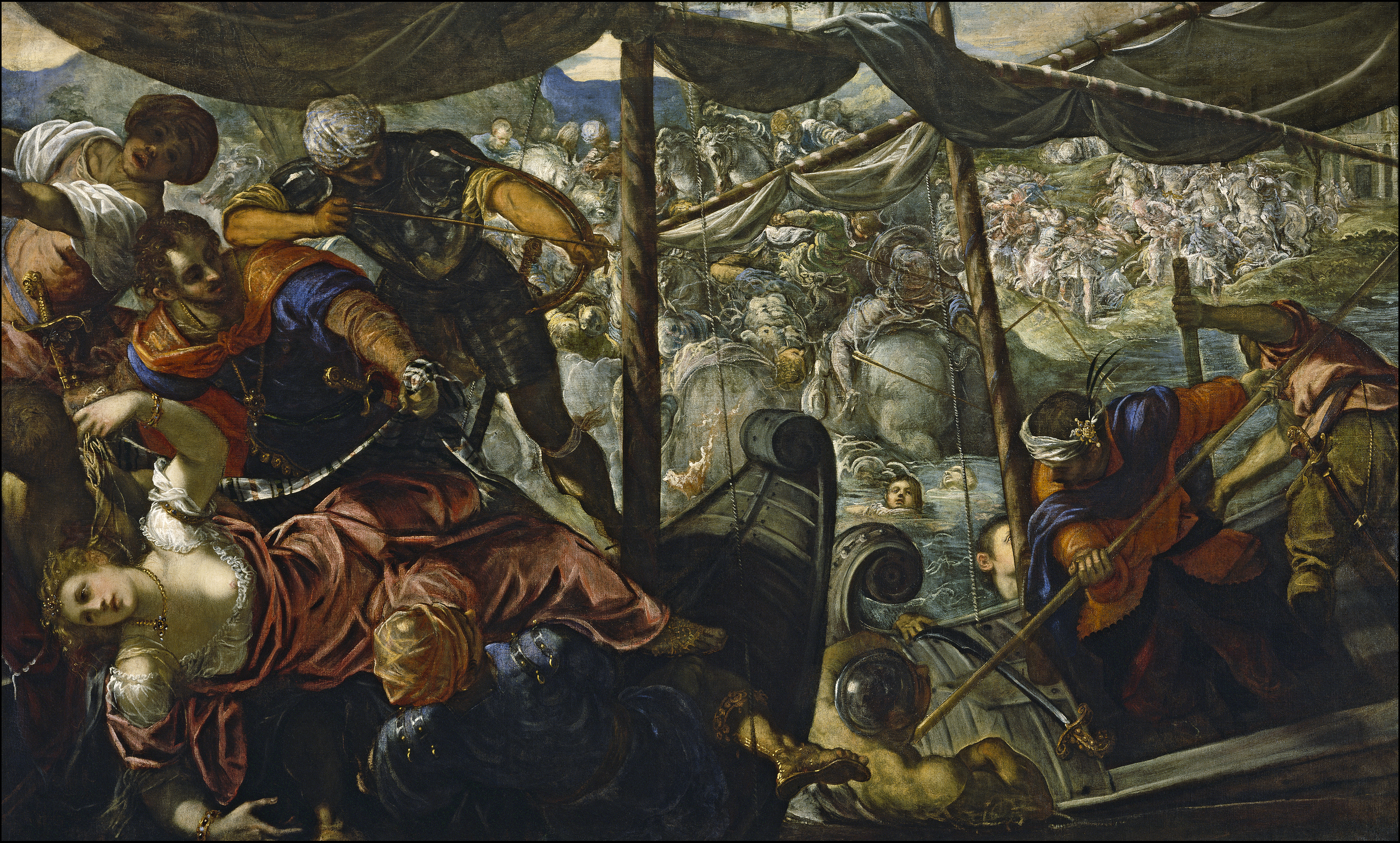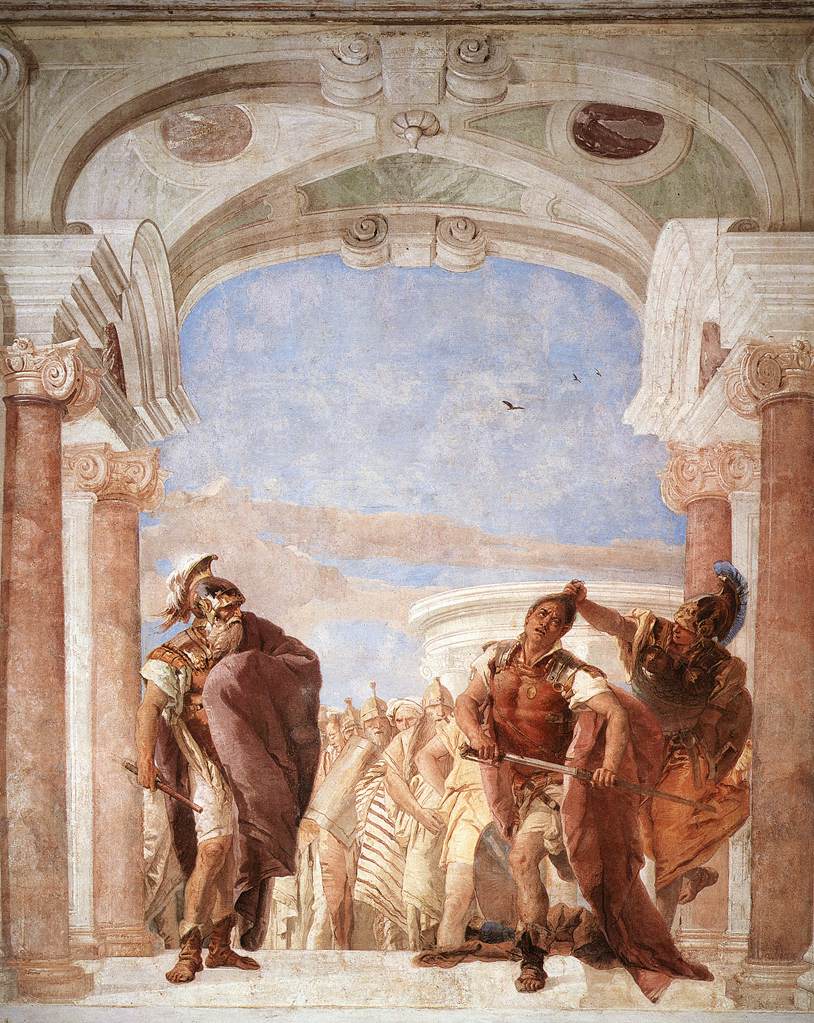 |
| Penelope, Laertes, and Telemachus |
|
|
The title is a dead-ringer for what this entry is all about. There are few notable women to compare her to, but Penelope stands head and shoulders above the other women of her era not only in terms of her intelligence, but the overall depth of her character. Even the infamous Helen serves as a rather one-dimensional persona- to tempt every man around her with her beauty, which often leads to their ruin.
Certainly Penelope is described by Homer as being a great beauty, even in her middle age during the events of the
Odyssey. But the difference is that her beauty is incidental and doesn't define her. While Helen doesn't seem to be much of a life partner to anyone- whether that be Menelaus or Paris (although we see hints of a partnership during Helen's cameos in the
Odyssey, perhaps as a sign of arranged marriage partners gradually warming to each other over the years), and Clytemnestra, Agamemnon's wife is the ultimate example in the myths of a relationship gone bad (more on that later), Penelope is the ideal companion that any strong man even today would want. Like Agamemnon serving as Odysseus' foil throughout the Odyssey, Clytemnestra serves as Penelope's. The former's relationship disintegrated while the latter's stood firm despite all the signs throughout the poem that it should not have.
Penelope has been praised in the poem and for thousands of years for her faithfulness. Despite the fact that it would be common sense that Odysseus should be assumed dead after a decade of not returning home after the cessation of hostilities at Troy, Penelope cannot accept such a train of thought. Despite two decades of separation she still loves him dearly, even when continuing to be devoted to him is profoundly straining to both her emotional well-being and her son's future inheritance and interests. In modern economic theory, Penelope might be described as being
irrational. She is hoping beyond hope that Odysseus is still alive, despite overwhelming evidence pointing to the contrary, and is seemingly acting against her own self-interest (and certainly the interests of her son) in holding out, spurning the suitors. The
link between love and insanity is quite often described by scientists, and Penelope seems to fit the bill.
And yet Penelope is clearly not
acting insane or irrational (in the common parlance of the terms) in the poem and throughout her ordeal with the suitors. She is shown to be extremely clever and manipulative, matching her husband's own infamous wiles. While Odysseus devised the Trojan Horse, tricked the cyclops Polyphemus, and masterfully donned a disguise to manipulate the suitors, Penelope kept the suitors at bay for three years with her famous shroud ruse. Telling the suitors that it wouldn't be right to leave her house without weaving a shroud for her elderly father-in-law Laertes, she would weave by day and unweave by night, until she was finally caught shortly before the beginning of the
Odyssey and forced to finish. She makes it as hard on the suitors as she possibly can the entire way through, and ultimately sets before them the trial of the bow- the means of their destruction.
The bow raises some interesting questions into which Penelope's womanhood and faithfulness are intimately tied. Just as Odysseus returned home, it seems that Penelope is ready to marry another. Yet Penelope blurts out to the nurse Eurycleia to wash her master's feet when describing the stranger that is Odysseus. She quickly corrects herself by saying that the stranger was Odysseus' age only. Does Penelope know it was actually Odysseus or doesn't she? Homer gives us no definitive answer and the question is left ambiguous (this is a scene in which I particularly praise the TV miniseries in 1997 starring Armand Assente- it nailed the ambiguity spot-on). Perhaps Penelope simply knew that no suitor would be able to string Odysseus' bow, and could have used it as another ruse to wait out longer.
Regardless of the truth of the matter which we will never know, Penelope was instrumental to the suitors' destruction and setting things to rights. Without her steadfast resolve and her cleverness, Odysseus would never be able to have his
aristeia of the poem- his triumphant return.
Agamemnon admits as much at the beginning of Book 24, when he praises Odysseus- not for returning home and defeating the suitors, but for choosing the right woman in Penelope as his wife.
Agamemnon serves somewhat as Odysseus' antithesis throughout the poem. While his journey home was short and without trouble, his time at Troy left him out of the loop regarding the goings-on in Mycenae. Unlike Penelope, who managed to withstand two decades of her husband's absence without infidelity to him, Agamemnon's wife Clytemnestra was seduced by Aegisthus, and the two ruled Mycenae in his absence.
When Agamemnon returned, he suspected nothing and took no precautions. He proceeded to be murdered by the pair in his own home. This stands in contrast to Odysseus, whose journey home was the hardest of all the Greeks. Not knowing what went on in Ithaca in the two decades of his absence, Odysseus leaves his impulses behind and proceeds along a cautious route, winning him much praise from Athena in Book 13.
Likewise, Penelope held her fidelity to her husband, and was devoted to his interests. She is the opposite of Clytemnestra, who was unfaithful and devoted herself to causes opposing her husband's interests. A typical feminist might look at this as the reason why Clytemnestra is reviled while Penelope is praised. To a certain extent that's true, but it goes far deeper than that.
No one wants to be betrayed. The innermost sanctum of Hell in Dante's
Inferno was reserved for traitors for a reason. It is probably the most insidious act humankind is capable of, and it rightly brings out strong emotions in the victims of betrayal- building trust and intimacy with a person only to see it come crashing down in the worst way possible when the deception is revealed. Infidelity in matters of the heart is the worst of all acts of betrayal since intimacy is the closest between romantic and sexual partners. Such betrayal by a woman he shared the closest possible bond with is what happened to Agamemnon, and he praises Penelope for keeping true to her heart and not betraying Odysseus.
There is one other caveat to this. Obviously in the world as written by Homer, it was expected that women would marry and not remain single. If her husband died, she would marry someone else. However, Homer makes clear just how inferior the suitors were as compared to Odysseus.
They couldn't even string the man's bow. I highly doubt this would be the case if Odysseus' peers at Troy were amongst the suitors, but they weren't. The suitors, despite their noble lineage and ample wealth, were simply not Odysseus' peers- they were still lesser men.
Hypergamy- the act of marrying or mating 'up' in social status amongst women in particular, is a common notion in the field of evolutionary psychology. From a female perspective, it simply makes sense to mate with a man of higher standing than herself (for men it may in fact be somewhat the opposite). Yet the suitors, in addition to being rude and discourteous, were simply not in Odysseus' league, and Penelope was not attracted to them. It is not surprising that she was hesitant to remarry.
And? She shouldn't have had to to. Telemachus, despite lamenting at the loss of his inheritance, couldn't bear pushing his mother out against her will, showing his respect for her. Odysseus' triumphant return nulled that possibility.
Through their love and devotion to each other, against all odds and despite the high costs in emotional turmoil and drained wealth over the years, Odysseus and Penelope were reunited and their marriage seemed to be as strong as it ever was. They are the perfect companions- equal in status and intelligence, respectful of one another to the foremost extent, and united in their interests to have a strong family. They would never turn their backs on each other and would feel incomplete without the other's presence, supreme in their diametrical spheres (the battlefield and politics versus the domestic life at home).
Of course, Odysseus did in fact sleep with other women than Penelope during the two decades of his absence, but that's another topic.
Overall, Penelope is the most dimensioned, interesting, and threshed out woman in the Epic Cycle (the only other woman that comes close is Andromache, Hector's wife, but she is not given agency to the extent Penelope is). She is not merely incidental to the male action that is the central focus of the story of the war in Troy and the heroes that fought in it, but a crucial player in the life of one of the central characters, and thus becomes one herself. While other women in the story can simply be seen as sometimes dangerous status symbols conferred upon the heroes (Briseis and especially Helen come to mind), Penelope controls her fate in a way many others do not- and bears the at-times awful responsibilities of such agency in her world. She rises to meet these challenges, and unlike Clytemnestra (who is thus cast into the role of the evil, though one-dimensional villain for the hero to take revenge upon), does so in the best of ways, making her happy reunion with Odysseus all the happier.
 |
| Odysseus and Penelope, by Francesco Primaticcio |















